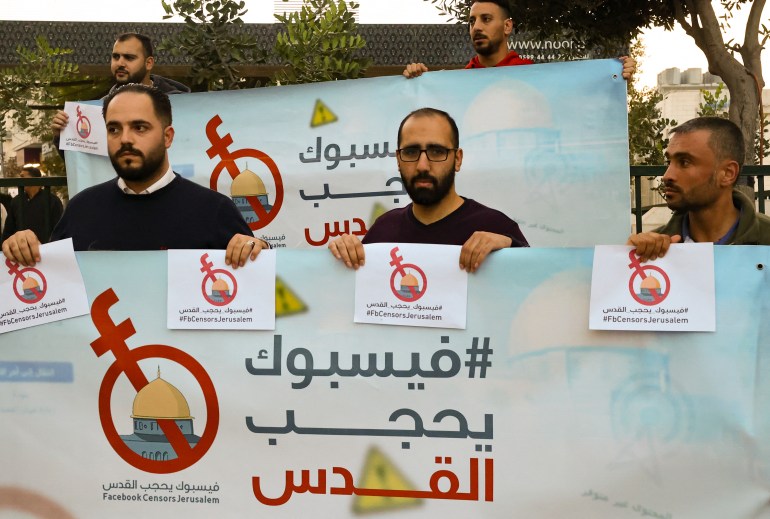The oversight board of Meta, the social media big which owns Fb, Instagram and WhatsApp, has dominated {that a} ban on using the phrase “shaheed” – “martyr” in Arabic – ought to be lifted. Meta has acknowledged that the time period “shaheed” accounts for extra content material removals beneath the corporate’s content material moderation coverage than every other single phrase or phrase on its platforms.
In a coverage advisory be aware, the corporate’s oversight board said: “The Board has found that Meta’s current approach disproportionately restricts free expression, is unnecessary, and that the company should end this blanket ban.”
Meta’s oversight board was established in 2020. It’s funded by Meta however operates independently of the corporate. When Fb and Instagram make selections to take away sure content material from their platforms, Meta can ask the board to overview these selections, significantly after they trigger controversy. The board successfully acts as an ombudsman which makes suggestions and points rulings both endorsing or overruling such selections made by Meta.
Here’s what we all know concerning the advice made by the oversight board and the way it got here to its resolution.
Why does Meta take away content material containing the phrase ‘shaheed’?
Meta’s present content material moderation coverage considers that the time period “shaheed” is used as “praise” when it’s talked about in relation to organisations which have been included on its Harmful Organizations and People (DOI) listing.
The highest tier of this listing consists of what it phrases “hate organisations; criminal organisations, including those designated by the United States government”. In response to Meta, these are people and organisations that are deemed to be participating in “serious offline harm”.
The coverage advisory from the oversight board comes after repeated criticism levelled in opposition to Meta over its strategy in the direction of content material posted by Palestinian and Arabic audio system.
Most just lately for instance, in December final yr, Human Rights Watch issued a report which concluded that Meta’s content material moderation insurance policies amounted to censorship of content material regarding the persevering with Israel-Palestine battle.
In a 51-page report, the human rights group mentioned that Meta had misused its DOI coverage to “restrict legitimate speech around hostilities between Israel and Palestinian armed groups”.
Meta started its personal inside dialogue in 2020 over its strategy to using the time period “shaheed” on its platforms however failed to succeed in a consensus.
An unbiased investigation launched by the group in 2021 discovered the corporate’s content material moderation insurance policies “appear to have had an adverse human rights impact on the rights of Palestinian users”, and have been adversely affecting “the ability of Palestinians to share information and insights about their experiences as they occurred”.
In February final yr, subsequently, Meta requested the oversight board to offer a coverage advisory about whether or not it ought to proceed to take away content material utilizing the Arabic time period in reference to people or teams designated beneath its DOI coverage.

How did the oversight board go about contemplating this situation?
Nighat Dad, a member of the oversight board, instructed Al Jazeera that Meta steered a number of choices for the board to contemplate, together with sustaining the established order, however the board was not certain by these choices and likewise explored different avenues after “extensive, more than a yearlong deliberation”.
She added that the group’s dialogue on the utilization of “shaheed” concerned testing out the suggestions in real-life conditions after the struggle began in October final yr.
“We wanted to see how people will use Meta platforms and did our research to see people’s usage. We found out that our recommendations held up even under the conditions of the current conflict,” she mentioned.
What did the oversight board suggest?
In its report, which was issued on March 26, the oversight board mentioned Meta’s present strategy to the time period “shaheed” is “over-broad, and substantially and disproportionately restricts free expression”.
The report additional added that Meta had failed to understand the time period’s “linguistic complexity”, saying its content material moderation insurance policies solely handled it because the equal of the English phrase “martyr”.
The board noticed that Meta operated on a presumption that reference to any particular person or organisation on the designated listing “always constitutes praise” beneath the corporate’s DOI coverage, resulting in a blanket ban.
“Doing so substantially affects freedom of expression and media freedoms, unduly restricts civic discourse and has serious negative implications for equality and non-discrimination,” it added.
Dad mentioned discussions throughout the board have been in depth because the group explored using the time period in several contexts and “paid extremely close attention to potential for real-world harm with any policy change”.
“We, as board, ultimately decided that Meta’s approach to tackle the word was counterproductive, which often affected journalists from reporting on armed groups as well as limited people’s ability to debate and condemn violence,” she mentioned.
Are suggestions from the oversight board binding?
Meta mentioned it could overview the board’s suggestions and reply inside 60 days. Nonetheless, the board’s suggestions on this matter should not binding.
“Our decisions on any matter related to Meta are binding, but when it comes to policy advisory which is sought by Meta itself, they are not,” Dad defined.
Nonetheless, she added, the board has a “robust mechanism” by way of which it could observe up and be certain that implementation of the advice is taken into account.
“We have an implementation committee, and we regularly reach out to Meta to follow up on what they have done with our advisory opinion,” she mentioned.

